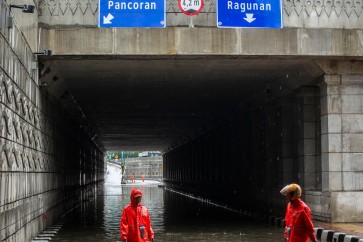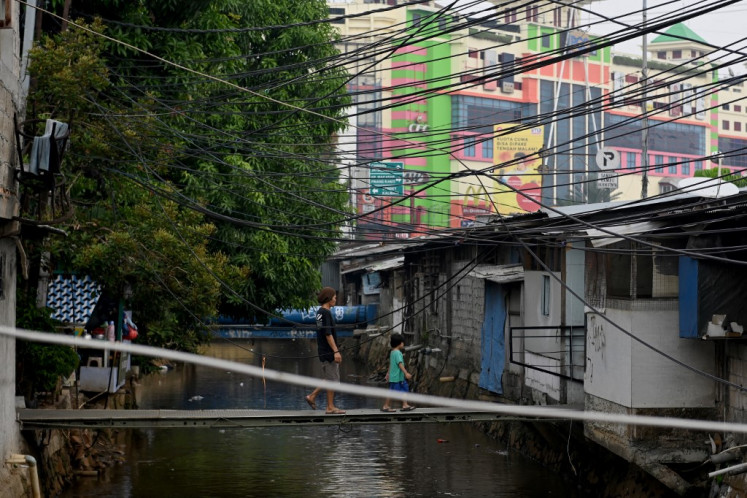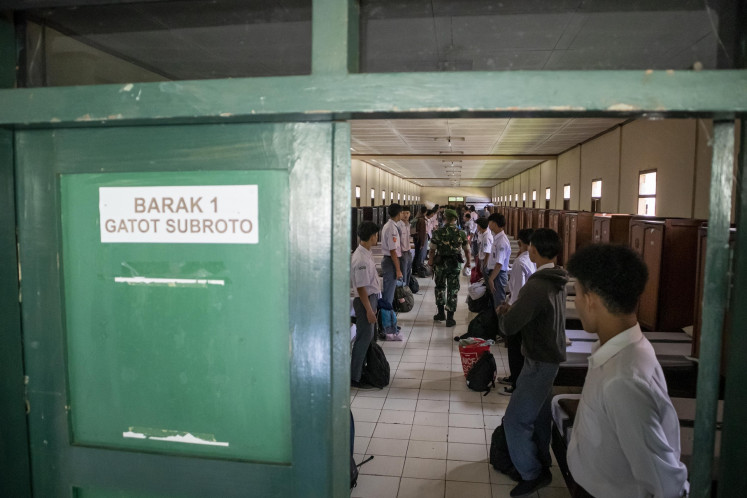The downside risk rising for the Indonesian economy
The main feature of Indonesian GDP growth in the first quarter 2012 was a decline in contributions from exports
Change text size
Gift Premium Articles
to Anyone

T
he main feature of Indonesian GDP growth in the first quarter 2012 was a decline in contributions from exports. Because of its weakening growth, exports will be a drag on GDP growth in 2012.
If the 6.5 percent growth target is to be achieved, then private consumption and investment have to grow at a higher rate than in first quarter.
Growth in consumption is related to purchasing power, which is why it is important to keep inflation low throughout the rest of the year, especially in food prices, as food price index is the biggest component of the overall inflation index.
It is unfortunate that there has been a spike in food inflation from 2.9 percent in February to 6.7 percent in April due to the rise of inflationary expectations, resulting from uncertainties regarding fuel prices.
To mitigate the effect of food price increases on inflation, Bank Indonesia will have to concentrate on its two main functions: maintaining rupiah exchange rate at level that is compatible with curbing imported inflation and controlling base money growth.
One of the reasons for the decline in inflation in first quarter 2012 was because BI had been able to significantly cut base money growth from a 35 percent annual rate in October 2011, to around 15 percent in February 2012.
Stimulus programs in the form of lower tax rates for low-income brackets would be helpful to support purchasing power. It is unfortunate that the expansionary effect of government spending will be restricted because of the huge fuel subsidy.
Up to 2011, the Indonesian economy was barely affected by economic crisis in Europe. But this is no longer the case.
The slowdown of growth from 6.5 percent in 2011 to 6.3 percent in first quarter 2012, reflected the impact of the prolonged and weak economic recovery in the US and Europe on the Indonesian economy.
This shows that downside risks for the Indonesian economy from the global economy still persist and warrant preparedness and caution from policymakers.
The Central Statistical Office’s (BPS) release of its report on 2012’s first quarter GDP growth coincided with the results of general elections in France and Greece, which jolted economic policymakers every where.
The prospect of economic recovery in Europe has been thrown into uncertainty, as the newly elected political parties in France and Greece won on their stances against the austerity measures that have been the hallmark for containing economic crisis in the eurozone.
New political leadership might abandon the painful austerity measures, and adopt more pro-growth and accommodative fiscal policies. The question is whether the economic recovery can be kept on track amid the erosion of fiscal discipline and mounting deficits.
If efforts for recovery in Europe stall and the crisis deepens, the downside risks for the Indonesian economy will increase.
Export growth would be more depressed, and the disruption in the financial market would adversely impact capital flows, undermining macro economic stability.
On the domestic front, downside risks are reflected in the uncertain prospects regarding the
government’s 2012 budget. Budget projections have been clouded by the huge fuel subsidy looming on the horizon if a fuel-price increase is not implemented.
The problem will be amplified by rising fuel consumption spurred by strong economic growth. It is estimated that the volume of subsidized fuel as approved by the House of Representative will run out in October.
And with geopolitical tensions in the Middle East easing and the recovery in the US and Europe weaker than expected, there is a slim chance that the Indonesian Crude Price (ICP) will climb above US$120.75 per barrel, the threshold for considering a fuel-price increase.
That means that there wouldn’t be a fuel-price increase this year, creating a hole in the budget and bigger deficits.
The only hope for the government to avoid a budget deficit of more than 3 percent of GDP as mandated by law is to find additional revenues and cost savings.
The planned export tax on unprocessed raw minerals and gas price increases, which have been recently agreed upon with gas producers, would bring some consolation to the government.
But the amount is well below the costs of the fuel subsidy that the government would have to bear.
And the room for cost savings is getting more limited, as the government has already trimmed the
budget in many areas.
Since the government cannot touch mandatory spending on items like salaries and pensions, the worst case scenario is discretionary spending on capital expenditures and social program may face cuts just to keep the budget deficit in line. This would hurt infrastructure development and efforts to alleviate poverty.
Export growth as a component of GDP fell from 13.6 percent in 2011 to 7.8 percent in first quarter of 2012, although commodity price index according to the World Bank rose between 7 percent to 10 percent in that quarter.
Export contributions to GDP growth declined from 6.3 percent in 2011 to 3.7 percent in 2012. Had export growth maintained its level as in 2011, GDP growth would be higher than 6.3 percent in first quarter 2012.
Exports from outside the oil and gas sector grew only 4 percent year-on-year in first quarter of
2012. This was a steep fall from 9 percent growth in the fourth quarter of 2011, and a dramatic fall from 38 percent growth in the second quarter of 2011.
Exports to major destinations such as ASEAN, the US and EU declined. Exports to China rose by 37 percent, but that level was in itself a drop of $1.7 billion from $6.7 billion in the fourth quarter of 2011.
Commodities exports to China mostly saved Indonesian exports from a steeper decline in the first quarter of 2012. However, China’s economy has been slowing down recently, and this would adversely affect the Indonesian economy.
So the downside risks facing the Indonesian economy do not come entirely from the developed economies — they also come from Asia.
The writer is an economist









